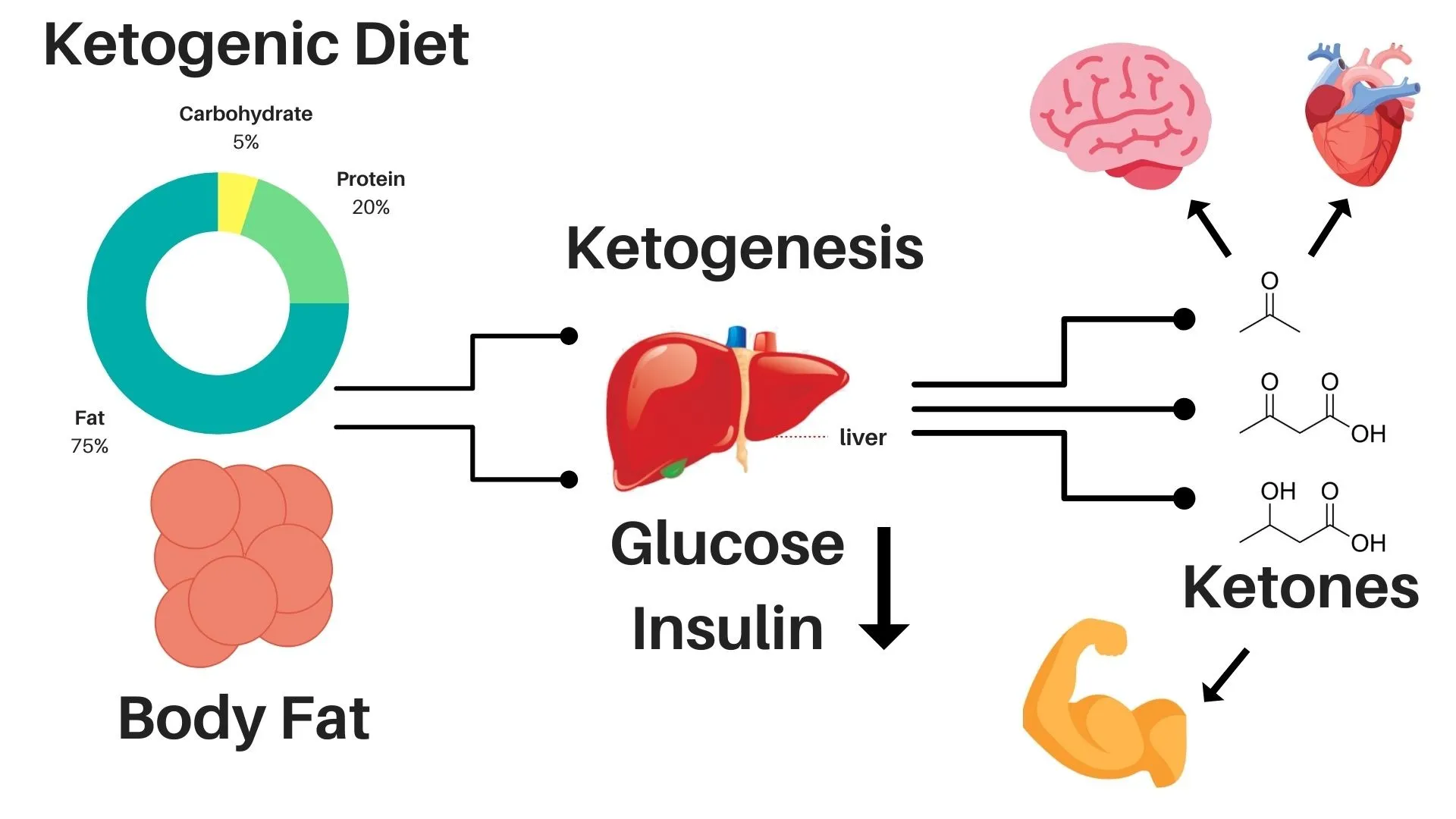 English
EnglishThe Effect of ketogenic diet on bone and joint disease
Bone and joint disease is a serious health problem leaving global impact on millions of people, that reduces their mobility and quality of life. The ketogenic diet, with its proven benefits such as weight loss and blood sugar control, is gaining interest as a treatment for many conditions. According to a study published in the American Journal of Clinical Nutrition, the ketogenic diet may reduce inflammatory markers in patients with rheumatoid arthritis. However, more in-depth studies and long-term clinical data are needed to accurately assess the effects of the ketogenic diet on other forms of bone and joint disease.
1. What is the ketogenic diet?
The ketogenic (keto) diet is a nutritional approach that focuses on minimizing carbohydrates (carbs) and increasing fats, which has been shown to bring various health benefits. Scientific studies have shown that keto can effectively support weight loss, improve health indicators. Currently, ketogenic is being studied for its potential to treat diseases such as diabetes, cancer, epilepsy and Alzheimer’s.

The ketogenic diet has been shown to have various benefits for health
Results from a UK study showed that the keto diet was three times more effective at losing weight than the recommended diet for people with diabetes. At the same time, another study on diabetic patients also recorded a rate of 7-21% of participants who were able to stop using diabetes medication.
The ketogenic diet works on the principle of minimizing carbohydrate intake while increasing the intake of healthy fats. Upon the drop of carbohydrates amount in the body to a very low level, a special biochemical process takes place, switching the body into a state of “ketosis”. In this state, the liver begins to produce ketones from fat, and ketones become the main source of energy instead of glucose. Specifically, when carbohydrates are limited, blood sugar levels drop, leading to a decrease in the production of insulin – the hormone responsible for transporting sugar from the blood into cells. As a result, the body is forced to look for alternative energy sources. At this time, the liver will activate the process of breaking down fat into ketones, a type of molecule that can provide energy for most cells, including brain cells. This process, called ketosis, is the core mechanism of the ketogenic diet.

How the ketogenic diet works
2. Effects of the ketogenic diet on bone and joint diseases
The ketogenic diet has the potential to significantly benefit people with osteoarthritis by reducing inflammation, a key factor in the progression of diseases related to bone and joint. Research has shown that ketogenic diets can reduce important inflammatory markers such as C-reactive protein (CRP) and interleukin-6 (IL-6), which are factors that directly contribute to arthritis and cartilage destruction. Effective control of inflammation not only reduces pain but also significantly improves motor function, thereby improving quality of life and making it easier for patients to maintain daily activities.

Osteoarthritis affects the patient’s daily activities
However, it should be noted that the ketogenic diet also has the potential to have negative effects on bone and joint health if not followed properly. Strictly restricting certain food groups in this diet can lead to deficiencies in essential nutrients such as calcium and magnesium, which play a key role in maintaining bone density and bone strength. Therefore, to ensure safety and effectiveness, application of this diet requires proper nutritional supervision to limit risks, while ensuring adequate provision of essential nutrients for the skeletal system.
The effects of the ketogenic diet on bones and joints can vary significantly depending on many individual factors, including age, the specific type of bone and joint disease (rheumatoid arthritis, osteoarthritis, etc.), and the duration of the diet. Older adults, people with chronic bone and joint diseases, and people with other health problems need to be especially cautious and should be monitored more closely.
To minimize risks and maximize benefits, people should consult with their doctor or nutritionist before starting a ketogenic diet. Doctors can provide personalized advice on combining diet with appropriate exercise and supplementing with essential nutrients such as vitamin D, calcium, magnesium, and other minerals. Regular health monitoring, including bone density testing and biochemical markers, is also important to ensure long-term safety and effectiveness.

Patients should consult their doctor when starting a ketogenic diet
3. Health care for people with bone and joint problems
Diet plays a key role in maintaining bone and joint health. Increasing fiber not only supports the digestive system but also allows weight control, reducing pressure on joints. Prioritize foods rich in fiber such as green vegetables, fresh fruits, whole grains and beans. A balanced, fiber-rich diet helps you maintain a reasonable weight, reduces the risk of arthritis and improves the overall health of your bones and joints.

Prioritize a high-fiber diet
Regular exercise is essential to maintaining flexibility and strength of bones and joints. Strength and weight-bearing exercises such as walking, jogging, swimming, yoga, or tai chi all bring great benefits. Start with gentle exercises, then gradually increase the intensity and duration of your workouts. This not only helps increase bone density but also improves mobility and reduces pain.
Nutrition plays an important role in building and maintaining strong bones and joints. Omega 3, Calcium, vitamin D, and K are essential nutrients. Omega 3 has anti-inflammatory effects, reducing joint pain. Calcium and vitamin D help strengthen bones and prevent osteoporosis. In addition to allowing to regulate the amount of calcium in the body, vitamin K also has the ability to prevent calcification of blood vessels and soft tissues, promoting bone regeneration. These nutrients can be supplemented from natural food sources such as salmon, mackerel, milk, eggs, green vegetables, and nuts.

Omega 3 plays an important role in maintaining healthy bones and joints
In addition, you can supplement with Nutricare Bone nutritional products – researched and developed by the Nutricare Medical Nutrition Institute – USA (NMNI-USA), providing a specialized nutritional solution according to US standards, supporting strong bones and joints, increasing muscle mass. The special formula supplemented with Glucosamine is clinically proven to increase the production of synovial fluid and cartilage cells, enable lubrication of cartilage, and increase joint flexibility and elasticity. The trio of Calcium, K2, D3 with an outstandingly high Calcium content of 1800mg, allows to prevent osteoporosis effectively. Vitamin D3 enhances Calcium absorption in the intestine, combined with Vitamin K2 to help transport and increase the density of Calcium attached to the skeleton, maximizing the body’s effective use of Calcium. 50 nutrients with vegetable protein and whey protein from the US supports muscle mass enhancement. Two glasses of Nutricare Bone every day, combined with a suitable diet and exercises for comprehensive bone and joint health care.
Conclusion: An appropriate diet should be selected under the close guidance of a doctor or nutritionist, which is a key factor to ensure the safety and effectiveness of the diet, avoiding unwanted side effects. The combination of a scientific diet and regular exercise will bring the highest efficiency. Remember, health is a long-term journey, and maintaining a healthy lifestyle is the key to a healthy, happy life.
| References:
1. Ciaffi, Jacopo, et al. “The effect of ketogenic diet on inflammatory arthritis and cardiovascular health in rheumatic conditions: a mini review.” Frontiers in medicine 8 (2021): 792846. 2. https://www.vinmec.com/vie/bai-viet/ban-co-nen-thu-che-do-keto-vi 3. https://vienyhocungdung.vn/che-do-an-ketogenic-20160804153158527.htm 4. https://www.vinmec.com/vie/bai-viet/vai-tro-cua-che-do-keto-voi-suc-khoe-vi 5. https://pmc.ncbi.nlm.nih.gov/articles/PMC10868404/ 6. https://www.frontiersin.org/journals/nutrition/articles/10.3389/fnut.2021.634845/full 7. https://www.health.com/weight-loss/keto-diet-side-effects 8. https://www.vinmec.com/vie/bai-viet/loi-ich-cua-viec-bo-sung-canxi-magie-kem-viz 9. http://bvquany7a.vn/ky-thuat/omega3-va-cac-benh-li-ve-khop 10. https://tamanhhospital.vn/vitamin-khoang-chat/vitamin-k/ 11. https://nutritionsource.hsph.harvard.edu/healthy-weight/diet-reviews/ketogenic-diet/ |
